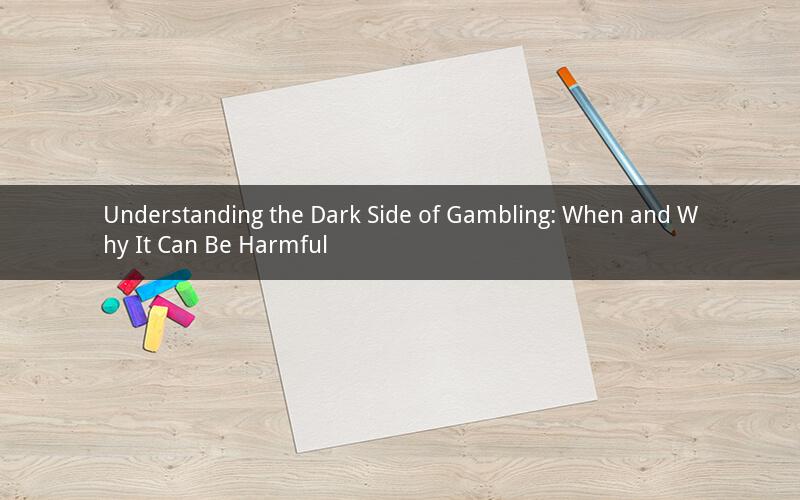
Introduction:
Gambling has been a popular form of entertainment and a source of income for many people around the world. However, not everyone realizes the potential dangers associated with it. In this article, we will explore the instances when gambling can be harmful and the reasons behind it.
1. What is considered bad gambling?
Bad gambling refers to situations where gambling becomes detrimental to an individual's physical, mental, emotional, and financial well-being. It often involves excessive gambling, financial loss, addiction, and negative consequences in various aspects of life.
2. When is gambling considered bad?
a) Financial problems: Excessive gambling can lead to significant financial losses, causing individuals to accumulate debt and face financial difficulties. This includes borrowing money, maxing out credit cards, or even taking out loans to support gambling habits.
b) Emotional distress: When gambling becomes an escape from real-life problems, it can lead to emotional turmoil, such as anxiety, depression, and feelings of guilt or shame.
c) Relationship issues: Excessive gambling can strain relationships with family, friends, and partners. It can lead to neglecting responsibilities, lying, and secrecy, ultimately damaging trust and communication.
d) Legal problems: Engaging in illegal gambling or breaking laws related to gambling can result in legal consequences, such as fines, arrests, or even imprisonment.
e) Physical health issues: Prolonged and excessive gambling can lead to physical health problems, including stress-related conditions, sleep disorders, and even cardiovascular diseases.
3. Why is gambling harmful?
a) Loss of control: One of the primary reasons gambling can be harmful is the loss of control over one's behavior. It can become an obsession, leading individuals to prioritize gambling over other important aspects of life.
b) Cognitive biases: Gamblers often experience cognitive biases, such as the illusion of control, overconfidence, and the tendency to believe they can predict outcomes. These biases can make individuals more susceptible to making poor decisions and continued gambling.
c) Social isolation: Excessive gambling can lead to social isolation, as individuals may prioritize gambling over spending time with loved ones or engaging in social activities.
d) Impaired judgment: The effects of gambling can impair judgment, making individuals more likely to make risky decisions, both in gambling and in other areas of life.
e) Psychological dependence: Some individuals may develop psychological dependence on gambling, leading to intense cravings and a sense of emptiness when not gambling.
4. How can bad gambling be addressed?
a) Seeking help: Individuals struggling with bad gambling should seek professional help from therapists, counselors, or support groups dedicated to gambling addiction.
b) Financial management: Establishing a budget and avoiding gambling when facing financial difficulties can help mitigate the negative consequences of bad gambling.
c) Setting boundaries: Setting limits on the amount of money and time spent on gambling can help prevent excessive gambling and potential financial and emotional harm.
d) Strengthening relationships: Engaging in healthy social activities and maintaining open communication with loved ones can help address relationship issues caused by bad gambling.
e) Legal compliance: Adhering to legal gambling regulations and avoiding illegal activities can help avoid legal problems associated with bad gambling.
5. Questions and Answers:
Q1: Can gambling be considered bad even if someone doesn't have an addiction?
A1: Yes, gambling can be considered bad if it leads to financial problems, emotional distress, relationship issues, legal problems, or physical health issues, regardless of addiction.
Q2: How can I determine if my gambling is becoming a problem?
A2: You can assess your gambling behavior by considering factors such as financial losses, neglecting responsibilities, feeling guilty or ashamed, and experiencing negative consequences in your life.
Q3: Is it possible to recover from bad gambling habits?
A3: Yes, it is possible to recover from bad gambling habits through professional help, self-help strategies, and support from friends and family.
Q4: Can gambling addiction be treated effectively?
A4: Yes, gambling addiction can be treated effectively through various methods, including therapy, support groups, and sometimes medication.
Q5: How can I support a loved one struggling with bad gambling?
A5: You can support a loved one by offering empathy, encouraging them to seek professional help, providing a safe and non-judgmental environment, and being there for them during their recovery journey.